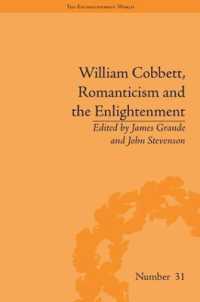Full Description
This book is a report of an investigation into the meanings of the modal auxiliaries in modern British English. The investigation took the form of a large-scale corpus-based project, looking at modal auxiliaries in both written and spoken language, and taking into account stylistic variation. The analysis of a corpus of a 'real' language brings the analyst face-to-face with a problem which has frequently been avoided or ignored in theoretical semantics: language is not an orderly phenomenon, and, as far as meaning is concerned, indeterminacy seems to be a feature of all languages. But it is one thing to recognise the existence of indeterminacy, and another to deal with it adequately. Semantic analysis conventionally consists in distinguishing one meaning from another, in recognising discrete categories, but the acknowledgement of indeterminacy explicitly denies the existence of such discrete categories. This book examines in detail this problem and its relationship to a study of modals.
Contents
1. Introduction 1.1. The Data 1.2. A Corpus-Based Approach 1.3. Assessment of Research Goals and Techniques 1.4. The Modal Auxiliaries 1.5 Notation 2. Theoretical Considerations 2.1. Monosemy versus Polysemy 2.2. A Model for Modal Meaning 2.3. Indeterminacy 2.4. Epistemic and Non-epistemic Modality 2.5. Corpus Analysis 3. General Findings and Semantic Clusters 3.1. The Modals: General Findings 3.2. Semantic Clusters 4. The Modals of Obligation and Necessity: MUST, NEED, SHOULD and OUGHT 4.1. MUST 4.2. NEED 4.3. HAVE GOT TO and HAVE TO 4.4. SHOULD 4.5. OUGHT 4.6. SHOULD and OUGHT: Further Issues 5. The Modals of Ability and Possibility: CAN and COULD 5.1. CAN 5.2. COULD 5.3. BE ABLE TO 6. The Modals of Epistemic Possibility: MAY and MIGHT 6.1. MAY 6.2. MIGHT 6.3. Epistemic COULD 6.4. Summary of MIGHT and COULD 7. The Modals of Volition and Prediction: WILL and SHALL 7.1. WILL (including 'll and won't) 7.2. SHALL 7.3. BE GOING TO 8. The Hypothetical Modals: WOULD and SHOULD 8.1. WOULD 8.2. SHOULD and Hypothetical Meaning 8.3. The Modals in Real Conditions 8.4. The Modals in Unreal Conditions 9. Conclusions 9.1. Reappraisal of Certain Issues 9.2. Patterns Revealed by the Data 9.3. Summary of Main Findings 9.4. Conclusion








